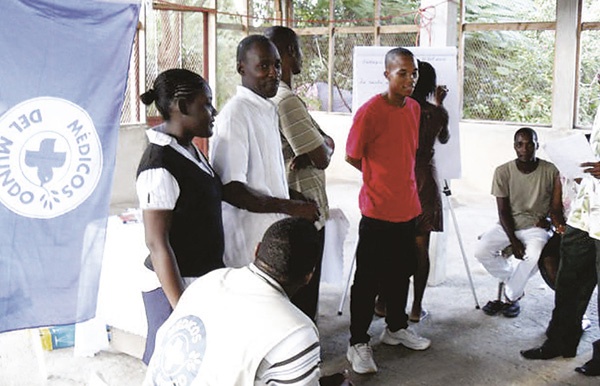Health Promotion by Fighting Cholera
With support from UNASUR, the Haitian Ministry of Health partnered with Doctors of the World, an international nongovernmental organization, to educate the public on cholera prevention and emergency response in the wake of the 2010 earthquake. The program delivered training to 450 people in community networks and rural grassroots organizations on health promotion, social determinants of health, and public surveillance. It held workshops for local authorities and networks, agrarian workers, and women and developed materials for community outreach and for the media.
Meets the criteria established under Health in All Policies:
- Political commitment. The strategy does not enjoy political commitment at the highest levels. Doctors of the World is the lead agency and the strategy is implemented with support from PAHO/WHO and UNASUR and in coordination with the Bureau of Water and Sanitation Management (DINEPA) of the Ministry of Public Health and Population (MSPP).
- Separate structure. The strategy created a Local Forum on Collective Health and Quality of Life as a participatory, multi-stakeholder assembly at the local level where all actors have institutional representation and decisions are taken by consensus.
- Participation of other sectors. The strategy involves authorities from different sectors, NGOs, and community networks and local organizations. Municipal districts, local promoters and grassroots organizations helped set up the community forums and develop preventive and promotional radio messages, among other activities. DINEPA provided materials and participated in all of the activities carried out under the strategy.
- Separate budget. The strategy is implemented with resources from UNASUR.
- Focus on reducing inequity. The cholera epidemic is strongest in and around the informal settlements of people who were displaced by the 2010 earthquake and therefore the program targets the most impoverished and vulnerable groups.
- Intersectoral action. While the intervention is implemented through the health sector, Doctors without Borders sponsors intersectoral forums on health and quality of life for a range of stakeholders (international and grassroots organizations, NGOs, churches, local governments, and the MSPP).
- Public policy. Doctors without Borders carried out integrated monitoring of health and sanitation through house-to-house visits in four stages: (1) establish a relationship with the family and describe the situation; (2) conduct the community epidemiological survey and identify social determinants; (3) focus on rights promotion and identifying determinants of cholera and water and sanitation problems; and (4) foster prevention, protection, and care through distribution of cholera prevention kits put together by the communities themselves.
- Evidence of results. While no scientific evidence was provided, monitoring and evaluation has been ongoing throughout the implementation process. An internal evaluation process involves direct participation from local stakeholders and a critical analysis matrix is used to track opportunities, progress, setbacks, threats and problems. Reports are submitted to various entities.
- Social participation. Rural community networks of grassroots and women's organizations have mobilized. They have held community-government assemblies for every 50 households to carry out needs assessments and identify priorities for action. The results are reported back to the municipality and the national MSPP.
